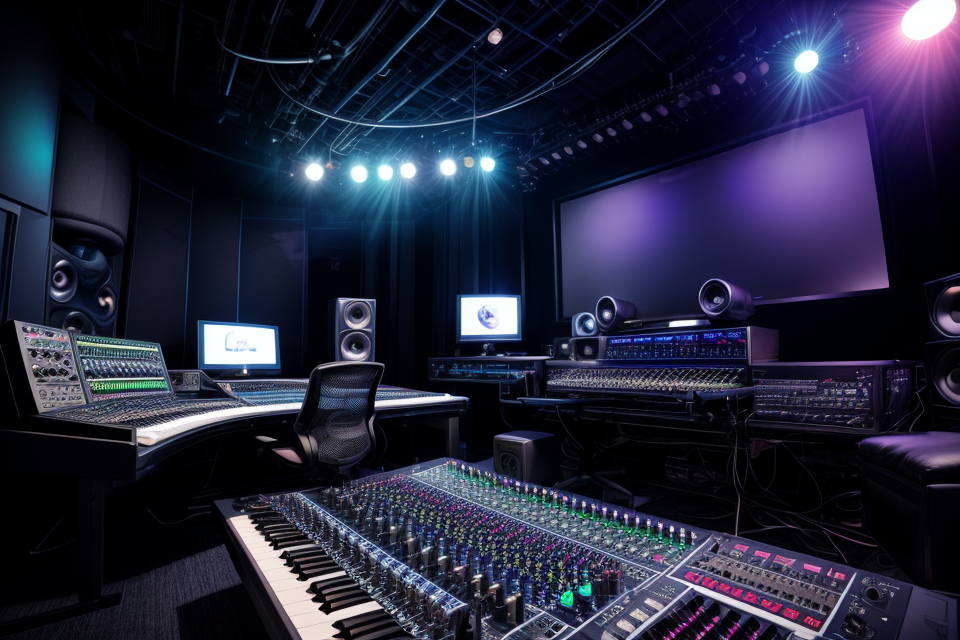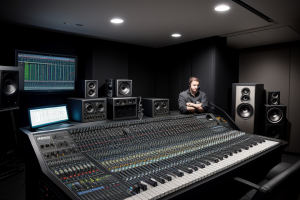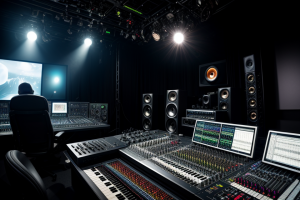
Are you a music lover with a passion for sound? Do you have a keen ear for detail and a flair for technology? If so, a career in sound engineering could be the perfect fit for you! In this article, we’ll explore the exciting world of sound engineering and examine whether it’s the right career path for you. We’ll delve into the day-to-day responsibilities of a sound engineer, the skills required to excel in this field, and the potential career paths available. So, buckle up and get ready to discover the thrilling world of sound engineering!
What is Sound Engineering?
The Basics of Sound Engineering
Sound engineering is the art and science of capturing, processing, and reproducing audio signals. It involves understanding the physics of sound, the principles of acoustics, and the technology of recording and reproduction.
To become a sound engineer, one must have a good ear for music and a passion for audio technology. A sound engineer must also have a strong foundation in mathematics, physics, and electronics.
The basics of sound engineering include understanding the frequency response of microphones and loudspeakers, the principles of equalization and compression, and the basics of signal flow. A sound engineer must also be familiar with the various types of audio equipment, such as microphones, mixers, and digital audio workstations (DAWs).
In addition to technical skills, a sound engineer must also have excellent communication skills, as they often work closely with musicians, producers, and other members of a production team. They must be able to understand the creative vision of the project and translate it into technical solutions.
Overall, the basics of sound engineering provide a solid foundation for those interested in pursuing a career in this exciting field. With a combination of technical knowledge, creativity, and communication skills, a sound engineer can bring music to life and help create unforgettable auditory experiences.
The Importance of Sound Engineering in the Music Industry
Sound engineering is a vital aspect of the music industry, as it plays a crucial role in shaping the overall sound and quality of a musical recording or performance. A sound engineer is responsible for capturing, editing, and mixing the audio tracks that make up a song, and for ensuring that the final product is polished and professional.
One of the key roles of a sound engineer is to manage the technical aspects of a recording session. This includes setting up and operating recording equipment, such as microphones and digital audio workstations (DAWs), and adjusting settings to capture the best possible sound. Sound engineers must also be familiar with a variety of software tools and techniques, such as equalization, compression, and reverb, which can be used to enhance the clarity and depth of a recording.
Another important aspect of sound engineering is the process of mixing, which involves combining multiple audio tracks into a cohesive whole. This requires a keen ear for balancing different elements, such as vocals, instruments, and effects, and a deep understanding of how different sounds interact with one another. A skilled sound engineer must also be able to communicate effectively with musicians and other members of the production team, in order to ensure that everyone is working towards the same creative goals.
Overall, the role of a sound engineer is to help bring out the best in a musical performance or recording, by using technical expertise and creative intuition to craft a polished and professional final product. In the competitive world of the music industry, the skills of a skilled sound engineer can make all the difference in helping an artist stand out from the crowd.
What Does a Sound Engineer Do?
Recording and Mixing Sessions
As a sound engineer, one of the most critical aspects of your job is to manage the recording and mixing sessions. These sessions involve capturing the live performances of musicians, singers, or any other audio sources and enhancing them to produce high-quality recordings. The process typically involves the following steps:
- Setting up the recording equipment: Sound engineers are responsible for setting up the necessary equipment for recording sessions. This includes microphones, digital audio workstations (DAWs), audio interfaces, and other related gear. The selection of equipment and its placement depend on the specific requirements of the session.
- Capturing the performance: Once the equipment is set up, the sound engineer’s role is to capture the live performance of the artist. This involves adjusting the levels of each microphone to ensure that the audio signal is clear and free of distortion. Sound engineers also need to be attentive to any technical issues that may arise during the recording, such as equipment malfunctions or connectivity problems.
- Editing and comping: After the recording is complete, the sound engineer will edit the audio tracks to remove any unwanted noises or inconsistencies. This process is known as comping and involves selecting the best takes from each performance to create a seamless final recording.
- Mixing: The next step is to mix the recorded tracks to create a balanced and cohesive audio production. This involves adjusting the levels, adding effects, and using equalization to enhance the overall sound quality. Sound engineers need to have a good ear for music and be able to make subjective decisions about the balance between different instruments and vocals.
- Mastering: The final step in the recording and mixing process is mastering. This involves applying a final polish to the audio production, optimizing the volume levels, and preparing it for distribution on various platforms. Mastering engineers use specialized software and hardware to achieve the desired sound and ensure that the music is suitable for streaming, broadcasting, or physical release.
In summary, recording and mixing sessions are a crucial aspect of a sound engineer’s job. They require a thorough understanding of audio equipment, technical skills, and artistic judgment to produce high-quality recordings that meet the artist’s vision and expectations.
Live Sound Reinforcement
Live sound reinforcement is one of the primary responsibilities of a sound engineer. This involves setting up and operating the sound equipment for live events such as concerts, theater productions, and other performances. The sound engineer’s goal is to ensure that the audience can hear the performers clearly and that the sound is of high quality.
In order to achieve this, the sound engineer must have a thorough understanding of audio equipment, including microphones, mixers, amplifiers, and speakers. They must also be familiar with the acoustics of the venue in which the event is taking place, as this can have a significant impact on the quality of the sound.
During a live event, the sound engineer is responsible for setting up the equipment, adjusting the levels, and monitoring the sound throughout the performance. They must be able to make quick adjustments to the sound in response to changes in the environment or the performance itself. This requires a high level of attention to detail and the ability to work well under pressure.
Live sound reinforcement is a critical aspect of many events, and it requires a skilled sound engineer to ensure that the audience has a positive experience. Whether it’s a small club show or a large-scale concert, the sound engineer plays a vital role in bringing the performance to life and creating an unforgettable experience for the audience.
Sound Design for Film and Television
Sound design for film and television is a critical aspect of the movie-making process. It involves creating and manipulating sound effects, dialogue, and music to enhance the overall auditory experience of a movie or TV show. The role of a sound engineer in this field is to ensure that the audio content is synchronized with the visual content and is of high quality.
Some of the tasks performed by a sound engineer in film and television include:
- Recording dialogue on set and in post-production
- Creating and manipulating sound effects to enhance the realism of a scene
- Designing and implementing the musical score for a movie or TV show
- Editing and mixing audio tracks to ensure they are synchronized with the visual content
- Calibrating and maintaining audio equipment to ensure optimal performance
Sound design for film and television requires a strong attention to detail and a creative mindset. Sound engineers must be able to visualize the final product and anticipate the audience’s response to the audio content. They must also be able to work collaboratively with directors, producers, and other members of the production team to ensure that the audio content enhances the overall quality of the movie or TV show.
In addition to technical skills, sound engineers in film and television must also have excellent communication skills, as they often work with actors, directors, and other crew members to ensure that the audio content is synchronized with the visual content. They must also be able to work under tight deadlines and manage multiple projects simultaneously.
Overall, sound design for film and television is a challenging and rewarding career path for those who are passionate about creating immersive auditory experiences. With the right training and experience, a sound engineer can play a critical role in the success of a movie or TV show and help bring stories to life for audiences around the world.
What Skills Do You Need to Be a Sound Engineer?
Technical Skills
In order to succeed as a sound engineer, it is important to possess a strong foundation in technical skills. This includes a deep understanding of audio equipment and technology, as well as the ability to troubleshoot and problem-solve when faced with technical issues. Some specific technical skills that are essential for sound engineers include:
- Knowledge of audio equipment and technology: A sound engineer must have a thorough understanding of the various types of audio equipment and technology that are used in the industry, including microphones, mixers, digital audio workstations (DAWs), and sound reinforcement systems.
- Ability to set up and operate audio equipment: In addition to having a strong understanding of audio equipment and technology, a sound engineer must also be able to physically set up and operate this equipment in a professional setting. This includes configuring microphones, setting levels, and optimizing sound quality.
- Familiarity with audio software and plugins: As technology continues to evolve, it is becoming increasingly important for sound engineers to have a strong understanding of audio software and plugins. This includes knowledge of digital audio workstations (DAWs), as well as specific plugins that are used for tasks such as EQ, compression, and reverb.
- Troubleshooting and problem-solving skills: Sound engineers must be able to quickly troubleshoot and solve technical issues that may arise during a live performance or recording session. This requires a strong problem-solving mindset, as well as the ability to think on your feet and make decisions quickly.
Overall, technical skills are a crucial aspect of a sound engineer’s toolkit. By developing a strong foundation in these skills, you will be well-equipped to succeed in this exciting and dynamic field.
Creative Skills
Sound engineering requires not only technical skills but also creative skills. As a sound engineer, you will be responsible for creating and manipulating sound effects, recording and mixing music, and designing soundscapes for various projects. Here are some of the creative skills that you need to possess:
- Melody and Harmony: Understanding the basics of music theory is essential for a sound engineer. You need to know how to create melodies and harmonies that blend well with the music you are working on. This requires an ear for music and the ability to think creatively.
- Sound Design: Sound design involves creating sound effects and ambient noises that enhance the overall audio experience. This requires a good understanding of sound properties, such as timbre, texture, and tone, as well as creativity and experimentation.
- Editing and Mixing: Sound engineers are responsible for editing and mixing audio tracks. This requires a good ear for music and the ability to make decisions about what sounds good and what doesn’t. You need to be able to balance different elements of the audio mix, such as vocals, instruments, and sound effects, to create a cohesive and engaging audio experience.
- Problem-Solving: Sound engineering is not always a straightforward process. You may encounter technical difficulties or creative challenges that require you to think outside the box. You need to be able to troubleshoot problems and come up with creative solutions that enhance the audio experience.
In summary, creative skills are essential for sound engineers. You need to have an ear for music, an understanding of sound properties, and the ability to think creatively to create engaging and immersive audio experiences.
Interpersonal Skills
Interpersonal skills are crucial for a sound engineer to have, as they are responsible for working with various individuals throughout their career. This can include musicians, producers, directors, and other members of the production team. A sound engineer must be able to communicate effectively with these individuals, as well as work collaboratively to achieve a common goal.
Effective communication is essential for a sound engineer, as they must be able to clearly and concisely explain their ideas and concepts to others. They must also be able to listen attentively to the needs and concerns of others, and respond appropriately. A sound engineer must also be able to work well under pressure, as deadlines and tight schedules are common in the industry.
Collaboration is also a key aspect of a sound engineer’s job. They must be able to work effectively with others, sharing ideas and offering constructive feedback. A sound engineer must also be able to adapt to changing circumstances and be willing to compromise when necessary.
In addition to these skills, a sound engineer must also have a strong technical knowledge of sound equipment and software. They must be able to troubleshoot problems and make adjustments as needed. However, technical skills alone are not enough to make a successful sound engineer. Interpersonal skills are just as important, if not more so, in this field.
Education and Training Requirements
Formal Education Options
A career in sound engineering requires a solid foundation in the technical aspects of audio production, as well as a deep understanding of the creative process involved in producing high-quality sound. For many aspiring sound engineers, pursuing a formal education is an essential step in gaining the skills and knowledge needed to succeed in this exciting field.
In recent years, a variety of educational institutions have emerged that offer specialized programs in sound engineering, audio production, and music technology. These programs provide students with the opportunity to learn from experienced professionals, gain hands-on experience with state-of-the-art equipment, and develop a comprehensive understanding of the art and science of sound engineering.
Some of the most popular formal education options for aspiring sound engineers include:
- Bachelor’s Degree Programs: A four-year bachelor’s degree program in sound engineering, audio production, or music technology provides students with a well-rounded education that covers the technical, creative, and business aspects of the field. These programs typically include coursework in areas such as acoustics, electronics, digital audio workstations (DAWs), mixing and mastering, and music theory.
- Associate Degree Programs: For those who wish to enter the workforce more quickly, an associate degree program in sound engineering or audio production can provide a solid foundation in the basics of audio production. These programs typically take two years to complete and cover topics such as signal flow, audio equipment, and basic recording techniques.
- Certificate Programs: For those who prefer a more focused education, certificate programs in sound engineering or audio production can provide students with a targeted set of skills and knowledge. These programs can range from a few months to a year in length and cover topics such as mixing and mastering, live sound, or music production.
Regardless of the specific program chosen, a formal education in sound engineering provides students with the opportunity to develop a strong foundation in the technical and creative aspects of audio production, as well as gain practical experience and make valuable connections within the industry.
On-the-Job Training
On-the-job training is a crucial aspect of becoming a sound engineer. This type of training is designed to provide hands-on experience and to develop practical skills that are essential for success in this field. It typically involves working alongside experienced professionals who can offer guidance and support as you learn the ropes.
Here are some of the key elements of on-the-job training for sound engineering:
- Learning the basics of sound equipment and technology: This includes understanding how different types of microphones, mixers, and other equipment work, as well as how to set up and operate them effectively.
- Gaining experience with recording software: Sound engineers need to be proficient in using software programs like Pro Tools, Ableton Live, and Logic Pro to edit and manipulate audio recordings. On-the-job training provides an opportunity to learn these programs in a practical context.
- Developing a keen ear for sound quality: Sound engineers need to have a strong sense of what good sound quality looks and sounds like. On-the-job training can help develop this skill by providing opportunities to listen to and analyze different types of audio recordings.
- Learning how to work with musicians and other professionals: Sound engineers often work closely with musicians, producers, and other professionals in the music industry. On-the-job training can help develop the communication and interpersonal skills necessary to work effectively with these individuals.
Overall, on-the-job training is an essential part of becoming a sound engineer. It provides a unique opportunity to gain hands-on experience, learn from experienced professionals, and develop the practical skills necessary to succeed in this exciting and dynamic field.
Continuing Education and Professional Development
Sound engineering is a dynamic field that requires constant learning and updating of skills. In order to stay competitive and relevant in the industry, continuing education and professional development are essential. Here are some ways to stay up-to-date in the field of sound engineering:
- Attend Workshops and Conferences: Attending workshops and conferences is a great way to learn about new technologies and techniques in sound engineering. These events often feature industry experts and provide hands-on training and demonstrations.
- Online Courses and Tutorials: Online courses and tutorials are a convenient way to learn at your own pace and on your own schedule. Many online platforms offer courses in sound engineering, covering topics such as mixing, mastering, and music production.
- Certification Programs: Certification programs are designed to provide a comprehensive education in sound engineering and offer a recognized credential for professionals in the field. Some examples of certification programs include the Audio Engineering Society (AES) and the Society of Broadcast Engineers (SBE).
- Networking and Collaboration: Networking and collaboration with other professionals in the industry can help you stay informed about new developments and technologies. Joining professional organizations and attending industry events can help you build relationships and learn from others in the field.
Overall, continuing education and professional development are crucial for staying competitive and current in the field of sound engineering. By investing in your education and training, you can ensure that you have the skills and knowledge needed to succeed in this exciting and ever-evolving field.
Is Sound Engineering a Good Career?
Job Satisfaction and Career Advancement Opportunities
Sound engineering is a rewarding career path that offers a high level of job satisfaction and numerous opportunities for career advancement. As a sound engineer, you will have the opportunity to work on a wide range of projects, from music recordings to live events, and collaborate with a diverse group of professionals.
Job Satisfaction
One of the main benefits of a career in sound engineering is the high level of job satisfaction it offers. Sound engineers play a critical role in the creative process, helping to bring music and other audio content to life. They have the opportunity to work with some of the most talented musicians and producers in the industry, and to be a part of the creative process from start to finish.
Sound engineers also have the opportunity to work on a wide range of projects, from small-scale recordings to large-scale live events. This variety ensures that sound engineers never get bored and always have new challenges to tackle.
Career Advancement Opportunities
In addition to job satisfaction, a career in sound engineering offers numerous opportunities for career advancement. Sound engineers can advance their careers by gaining experience and developing new skills, such as audio editing and mixing, music production, and sound design. They can also move into more specialized areas of sound engineering, such as film and television sound, game audio, or live event production.
Another way to advance in the field of sound engineering is to become a freelance sound engineer. Freelance sound engineers have the opportunity to work on a variety of projects and build a reputation as an expert in their field. They can also set their own rates and work on projects that interest them the most.
Overall, a career in sound engineering is a rewarding and fulfilling path that offers both job satisfaction and numerous opportunities for career advancement. Whether you are interested in music production, live event production, or film and television sound, a career in sound engineering is a great way to turn your passion for audio into a rewarding and fulfilling career.
Salary and Employment Outlook
When considering a career in sound engineering, it’s important to consider the potential salary and employment outlook. The field of sound engineering is a rapidly growing one, with opportunities available in a variety of industries, including music, film, and live events. According to the Bureau of Labor Statistics, the median annual wage for audio and video equipment technicians, which includes sound engineers, was $49,970 in May 2020. However, salaries can vary widely based on factors such as experience, location, and industry.
In terms of employment outlook, the field of sound engineering is expected to grow at a faster-than-average rate in the coming years. This growth can be attributed to the increasing demand for high-quality audio in a variety of industries, as well as advances in technology that have made it easier and more affordable to produce and record high-quality audio. As a result, there are likely to be plenty of job opportunities available for those interested in pursuing a career in sound engineering.
Challenges and Drawbacks of a Career in Sound Engineering
Sound engineering is a rewarding career path that offers numerous opportunities for creativity and innovation. However, like any profession, it has its own set of challenges and drawbacks. In this section, we will explore some of the most common challenges and drawbacks of a career in sound engineering.
- Late Nights and Weekend Work: Sound engineers often work long hours, including nights and weekends, to meet project deadlines. This can be especially challenging for those who value a work-life balance or have other commitments outside of work.
- Physical Demands: Sound engineering involves a lot of physical work, including lifting and moving heavy equipment, standing for long periods, and working in cramped spaces. This can be physically demanding and may require a certain level of physical fitness.
- High Stress Levels: Sound engineering can be a high-stress profession, especially when working on high-profile projects or under tight deadlines. This can lead to burnout and other health problems if not managed properly.
- Artistic Disagreements: As a sound engineer, you may work closely with artists and musicians to create the desired sound for their projects. However, there may be instances where you disagree with their artistic vision, which can be challenging to navigate.
- Constant Learning: Sound engineering is a constantly evolving field, and new technologies and techniques are emerging all the time. This means that sound engineers must continually update their skills and knowledge to stay relevant in the industry.
- Costly Equipment: Sound engineering requires expensive equipment such as microphones, mixing boards, and software. This can be a significant financial investment for aspiring sound engineers, and the cost of equipment may limit opportunities for some.
While these challenges and drawbacks may seem daunting, many sound engineers find the rewards of their career far outweigh the difficulties. With dedication, hard work, and a passion for sound, a career in sound engineering can be incredibly fulfilling.
How to Get Started in Sound Engineering
Building Your Skills and Expertise
To excel in the field of sound engineering, it is essential to continuously build your skills and expertise. Here are some practical steps to help you get started:
- Seek Out Mentorship: Look for experienced sound engineers who can guide you in your journey. Seek advice from them and ask for feedback on your work. They can help you avoid common mistakes and offer valuable insights that can accelerate your learning process.
- Take Online Courses: There are many online courses available that cover various aspects of sound engineering. You can learn about mixing, mastering, recording techniques, and music production. These courses are often affordable and can be completed at your own pace.
- Practice, Practice, Practice: Practice is crucial to mastering the art of sound engineering. Set up a home studio or work with local musicians to gain hands-on experience. You can also experiment with different equipment and software to find the right tools for your craft.
- Attend Workshops and Conferences: Attend workshops and conferences to learn from industry experts and network with other professionals. These events provide valuable insights into the latest trends and technologies in sound engineering.
- Join Professional Organizations: Join professional organizations such as the Audio Engineering Society (AES) or the Society of Broadcast Engineers (SBE). These organizations offer access to valuable resources, networking opportunities, and training programs.
By taking these steps, you can begin to build your skills and expertise in sound engineering. It is essential to stay committed to your craft and continue learning to succeed in this exciting field.
Networking and Building Relationships in the Industry
As you embark on your journey into the world of sound engineering, it’s essential to understand the importance of networking and building relationships within the industry. Networking is a vital aspect of any career, and it’s especially crucial in the music and audio industry, where connections can lead to job opportunities, collaborations, and a wider range of contacts. Here are some tips on how to effectively network and build relationships in the sound engineering field:
- Attend industry events: Attend music festivals, conferences, and workshops where you can meet professionals in the field. These events provide a great opportunity to network and learn about the latest trends and technologies in sound engineering.
- Join professional organizations: Joining organizations such as the Audio Engineering Society (AES) or the Recording Academy can give you access to a community of professionals and potential mentors.
- Volunteer: Offer to volunteer at concerts, festivals, or recording sessions. This is a great way to gain experience, meet professionals, and learn about different aspects of the industry.
- Social media: Use social media platforms like LinkedIn, Twitter, and Instagram to connect with professionals in the industry. You can also join online groups related to sound engineering and participate in discussions.
- Collaborate: Reach out to other musicians, producers, or sound engineers and offer to collaborate on a project. This can lead to long-term relationships and potential job opportunities.
Remember, building relationships takes time and effort. Be genuine, approachable, and interested in others’ work. Don’t be afraid to ask questions and seek advice from more experienced professionals. With dedication and perseverance, you can build a strong network of contacts that can help you succeed in the exciting world of sound engineering.
Finding Job Opportunities and Internships
Networking and Industry Events
One of the most effective ways to find job opportunities and internships in sound engineering is by networking and attending industry events. These events provide an opportunity to meet and connect with professionals in the field, learn about the latest trends and technologies, and potentially discover job openings.
Some examples of industry events include music festivals, audio conventions, and trade shows. Additionally, many cities host local meetups and networking events specifically for audio professionals. These events can be a great way to build relationships and gain valuable insight into the industry.
Job Boards and Online Resources
Another option for finding job opportunities and internships in sound engineering is through online job boards and resources. Websites such as Indeed, LinkedIn, and SoundGirls offer listings for audio-related positions. These websites also allow users to create job alerts, which can notify them of new postings that match their desired criteria.
Additionally, there are several online communities and forums dedicated to audio professionals, such as the Audio Engineering Society (AES) and the Recording Academy. These communities offer a platform for professionals to connect, share information, and potentially discover job opportunities.
College and University Job Boards
For those pursuing a degree in sound engineering, college and university job boards can be a valuable resource. Many universities have career centers that offer job postings specifically for students in audio-related fields. Additionally, many universities have relationships with local studios and audio companies, which can lead to internship and job opportunities.
Direct Outreach
Finally, another way to find job opportunities and internships in sound engineering is through direct outreach. This can include reaching out to local studios and audio companies, as well as reaching out to professionals in the field through social media or email. This approach can be especially effective for those looking for freelance or contract work.
Overall, there are many ways to find job opportunities and internships in sound engineering. By utilizing a combination of networking, online resources, and direct outreach, aspiring audio professionals can gain valuable experience and build a successful career in the exciting world of sound engineering.
Recap of Key Points
- Gain a Basic Understanding of Sound Engineering
- Learn about the different aspects of sound engineering, including mixing, recording, and live sound production.
- Familiarize yourself with the tools and technologies used in the field, such as audio equipment, software, and recording studios.
- Acquire Relevant Skills and Knowledge
- Enroll in a sound engineering course or degree program to develop technical skills and gain theoretical knowledge.
- Practice hands-on training through internships, apprenticeships, or work experience opportunities.
- Network and Build Relationships in the Industry
- Attend music events, concerts, and industry conferences to connect with professionals and learn about new trends and technologies.
- Join professional organizations and online communities to expand your network and stay up-to-date with industry news and developments.
- Consider Specializing in a Particular Area of Sound Engineering
- Identify your areas of interest and expertise, such as music production, film sound, or live event production.
- Pursue additional training or certifications to enhance your skills and credibility in your chosen specialization.
- Build a Portfolio of Work
- Create a portfolio of your work, including recordings, mixes, and live sound productions, to showcase your skills and abilities to potential employers or clients.
- Network with other professionals in the industry to gain feedback and support for your work.
- Seek Out Opportunities for Professional Development
- Stay current with industry trends and advancements through continuing education, workshops, and professional development courses.
- Consider pursuing advanced degrees or certifications to further enhance your skills and knowledge in sound engineering.
Final Thoughts on a Career in Sound Engineering
As you embark on your journey to become a sound engineer, it’s important to reflect on the pros and cons of this career path. Here are some final thoughts to consider:
Pros of a Career in Sound Engineering
- Opportunity to work on a variety of projects, from music concerts to film productions
- High demand for skilled sound engineers in various industries
- Possibility to work with and learn from experienced professionals in the field
- Exciting and dynamic work environment
Cons of a Career in Sound Engineering
- Requires long hours and hard work, including weekends and holidays
- Physically demanding, involving lifting and moving heavy equipment
- Competitive industry with limited job opportunities
- High stress levels due to the importance of getting the sound right for a successful production
Overall, a career in sound engineering can be both rewarding and challenging. It requires dedication, hard work, and a passion for music and sound. If you’re willing to put in the effort, this could be a fulfilling career path for you.
FAQs
1. What does a sound engineer do?
A sound engineer is responsible for capturing, recording, mixing, and reproducing sound for various events, live performances, movies, TV shows, and music recordings. They use sound equipment and software to ensure that the audio quality is clear, balanced, and meets the desired specifications. Sound engineers work closely with musicians, actors, directors, and other professionals to achieve the desired sound effects and enhance the overall production quality.
2. What skills do I need to become a sound engineer?
To become a successful sound engineer, you need to have a good ear for music and sound, technical skills, and creativity. You should also have knowledge of music theory, acoustics, and audio equipment. Proficiency in using audio software and digital audio workstations (DAWs) is essential. Good communication and teamwork skills are also important, as sound engineers often work with other professionals in the entertainment industry.
3. What education do I need to become a sound engineer?
There are different paths to becoming a sound engineer, but a formal education is often preferred. You can pursue a degree in sound engineering, music production, or a related field. Some sound engineers also have degrees in music, music technology, or acoustics. Many sound engineering programs include hands-on training with audio equipment and software, as well as practical experience working on real-world projects.
4. What are the job prospects for sound engineers?
The job prospects for sound engineers are generally good, as the demand for skilled audio professionals is on the rise. Sound engineering is a vital part of the entertainment industry, and as new technologies and media platforms emerge, the need for sound engineers who can adapt to new techniques and equipment is increasing. Many sound engineers work on a freelance basis, which offers flexibility and the opportunity to work on a variety of projects.
5. What is the salary range for sound engineers?
The salary range for sound engineers varies depending on factors such as experience, location, and the type of project they are working on. According to the Bureau of Labor Statistics, the median annual wage for audio and video equipment technicians (which includes sound engineers) was $49,930 in May 2020. However, experienced sound engineers can earn much higher salaries, especially if they work on high-profile projects or have a strong reputation in the industry.
6. What are the working conditions for sound engineers?
Sound engineers work in a variety of environments, including recording studios, live venues, film and TV sets, and outdoor locations. They may work long hours, including evenings and weekends, especially during live events or when working on tight deadlines. The work can be physically demanding, as sound engineers may need to lift and move heavy equipment. However, many sound engineers enjoy the fast-paced and dynamic nature of their work and the opportunity to be involved in creative projects.







